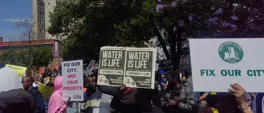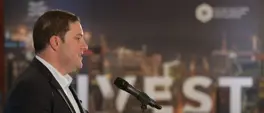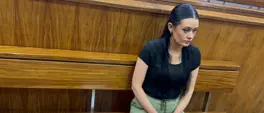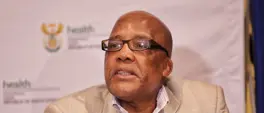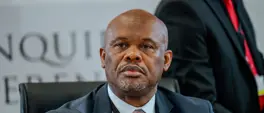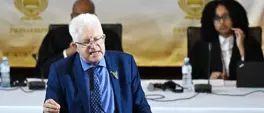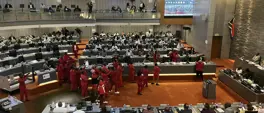CHARLES MATSEKE | The Republic of Commissions: General Khumalo’s testimony and the criminal cartel within
Charles Matseke
6 November 2025 | 17:04With the Madlanga hearings still unfolding, Charles Matseke warns of the danger that December will become a lull in documentation rather than a pause in action and that while the public turns to holidays, the state’s criminal-political networks will regroup, reallocate and reload.
- Madlanga Commission of Inquiry
- Police Crisis
- Crime Intelligence
- Dumisani Khumalo
- Shadrack Sibiya
- Katiso ‘KT’ Molefe
- South African Police Service (SAPS)
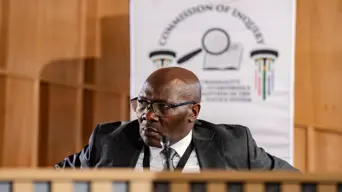
Crime Intelligence boss Dumisani Khumalo testifies at the Madlanga Commission of Inquiry sitting at the Brigitte Mabandla Justice College in Pretoria on 29 September 2025. Picture: Sphamandla Dlamini/EWN
In South Africa’s evolving spectacle of accountability, two things dominate: the emergence of new evidence, and the carefully timed pauses built into our political culture. As we approach the tail-end of the year, the Madlanga Commission is hearing testimony that could remake how the public views state-criminal capture. The problem is this: while evidence accumulates, the news cycle slows. Yet the machinery of capture doesn’t.
Since my recent contributions to Primedia News South Africa’s Quiet Privatisation and the Birth of an Oligopoly, The Katiso Molefe Case Exposes South Africa’s Descent into Elite Impunity and The Republic of Commissions: Why Exposing Rot Isn’t the Same as Uprooting It, I have argued that the capture of institutions now depends less on what is exposed and more on whether exposure changes anything. The new evidence emerging this week reinforces that argument and raises the stakes.
Lieutenant-General Dumisani Khumalo, head of Crime Intelligence, returned to the commission this week with CCTV footage, bank-trace evidence and internal SAPS documents that link senior officers to a criminal network dubbed the “Big Five” cartel.
CCTV shows Sergeant F. Nkosi (a subordinate of suspended deputy national commissioner Shadrack Sibiya) entering the Sandhurst residence of businessperson Katiso “KT” Molefe and exiting minutes later carrying a large white paper bag. The vehicle used was a white BMW registered to SAPS; investigators found its tracking device either inactive or removed.
Khumalo testified that senior Crime Intelligence posts remain unfilled because of a stalemate between Khumalo and Sibiya, meaning half the provinces lack a head of Crime Intel. Further slides show Sibiya driving a Toyota bakkie registered under a criminal, Scharnick Stuart James, who was convicted in 18 cases of hijacking and theft. Khumalo said this underscores how senior officials appear to maintain close ties with known criminals.
When placed alongside the previousrevelations about Molefe and his cartel network (including the tender fraud, contract killings and Pretoria-Gauteng drug syndicates), the picture becomes clearer: this is not a small clique of corrupted actors, but a systemic network of state, business and criminal collusion. And the data now triangulates across multiple sources.
This is the kind of evidence that should shock any democracy. But in South Africa, the familiar rhythms apply: promise of inquiry, spectacle of evidence, then the pause of the festive news cycle. The question is: will the pause be used by the powerful to regroup?
My earlier op-eds argued that exposure alone changes nothing. For example, the Molefe investigation revealed in October was not just about one man: it was about the architecture of capture.
And now Khumalo’s testimony adds new nodes to that architecture, mapping not just Molefe but the facilitators within the SAPS, the judiciary and the political elite.
Elite impunity works because it has time on its side. It survives when public attention wanes and when institutions stall. The Madlanga Commission’ revelations show that key posts remain vacant, that the state’s biggest crime-intel unit is incapacitated, and that senior officers may be actively complicit in criminal networks.
In the broader commentary, I charted how the media narrative often substitutes for meaningful reform. Victims become stories; villains become isolated; the system becomes invisible. The new data now reinforces the need to shift from mere exposure to structural accountability.
Consider the question of the white BMW. In the prior articles, I noted similar vehicle patterns across murders (the Swart assassination, among others). With this latest footage, the vehicle becomes a connective tissue across cases. Yet how many headlines call this a pattern rather than an isolated incident? How many analysts ask: If the vehicle travels across murders, why does each case continue to be treated in isolation?
The data demands we move from anecdote to architecture. The media’s role cannot be simply to report the moment; it must interrogate the system that produces the moment.
With the Madlanga hearings still unfolding, South Africa is at a crossroads. If the commission leads only to more revelations and no convictions, the pattern is reinforced: inquiry becomes performance and impunity remains the permanent structure. But if the data now being revealed is acted upon and if senior officers are prosecuted, if posts are filled, if institutions are rebuilt, then we might now be witnessing the beginnings of the transition I discussed in “Toward 2029: The Case for a New Political Realignment.”
This means: Transparent publication of tracking logs for vehicles registered to SAPS units; A publicly verified list of senior posts vacant across Crime Intelligence with reasons; Full disclosure of tender contracts linked to Molefe, Matlala and associates; Independent oversight of the Madlanga Commission’s implementing agency to guarantee action, not just testimony.
The dangeris that December will become a lull in documentation rather than a pause in action. While the public turns to holidays, the state’s criminal-political networks don’t. They regroup, reallocate, reload.
What the triangulated data now shows is that those networks operate under a regime of temporal invisibility: they align themselves with the news cycle, knowing that when evidence emerges, the public’s attention will drift.
Thus, the journalist who frames the narrative, the commission that hears the case, the editor who decides when to publish, all of them have a responsibility beyond the story: they have a responsibility to continuity. "In the republic of commissions, perhaps one day there will be a commission for the republic of truth where the bag, the BMW and the vacant post matter not for the moment but for the system they reveal."
In sum: the data is out. The triangulation is clear. The architecture of elite impunity is visible in real time. What remains is not another inquiry but a decision to act. December must not be a pause in detection, it must be a launchpad to accountability. If South Africa is to survive beyond spectacle, then justice cannot wait for the next news cycle. It must outlast it.
Charles Matseke (MPhil in Politics and International Relations) is a researcher and writer with a keen interest in contemporary political dynamics. His research focuses on electoral politics, foreign policy analysis, and international relations, with a particular emphasis on the Global South and Africa's role in global affairs.
Get the whole picture 💡
Take a look at the topic timeline for all related articles.
Trending News
More in Opinion
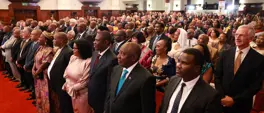
19 February 2026 05:15
CHARLES MATSEKE | From State of the Nation to Republic of Commissions: SA's playhouse of accountability
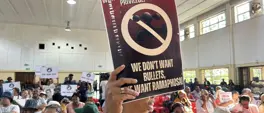
18 February 2026 17:30
VUYANI PAMBO | Biko, Bonga, and the running waters of Gauteng: Towards a liberation theology for South Africa's 2026 Elections
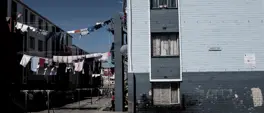
13 February 2026 10:24
JAMIL F. KHAN | Crime is not the disease, it’s the inheritance
